A former therapist and coach told me once that grief can feel pleasurable in an unexpected way because every other emotion is heightened. You’re sad but also recognizing the transience of life and because of that transience, strawberries taste sweeter and time with loved ones is more precious. When he said this to me, I told him he was off his rocker because there was nothing pleasurable about grief but now I see what he meant.
We’re theoretically in the “happiest time of the year,” but against the backdrop of the holidays with the sparkly lights, sappy movies, and festivities, I’m sad. I’m grieving the loss of people I knew well and people that I didn’t. In the background, there’s a refrain that so-and-so isn’t here anymore and so every moment becomes more precious because I know in my bones that tomorrow isn’t promised. Grief shakes me from the dream where I think I know how anything will play out. I don’t. I really, really don’t.
My former therapist is right. My heart, it hurts. It’s squeezing in my chest and feels tender and fragile. And yet, because of the pain, there’s also more pleasure because when I come across delightful things, they are more delightful. A father and daughter were on the same Bart train as me to the airport, and then on the same flight to Seattle, and then they also took the Seattle light rail and sat next to me on that train. I watched the daughter swinging from the rail above her head as if it were monkey bars and smiled.
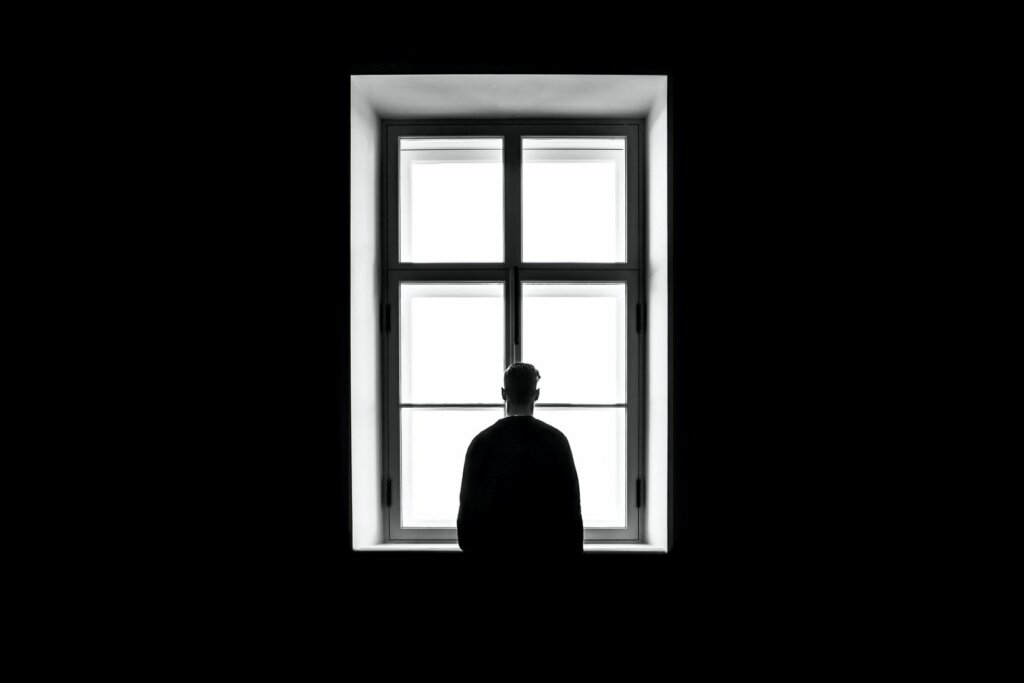
Darkness and light are paired together. Photo by Sasha Freemind on Unsplash
I look at the birds nibbling seed from the feeder outside my parents’ window and say, “Wow. You’re so beautiful.” The sun seems to shine brighter, flower colors are more vibrant, and everything is amplified right now because death is also so present. I’m hugging my parents a little tighter, a little longer, aware that our time together is limited.
Rashani Réa speaks to this in her poem, “The Unbroken:”
There is a brokenness
out of which comes the unbroken,
a shatteredness
out of which blooms the unshatterable.
There is a sorrow
beyond all grief which leads to joy
and a fragility
out of whose depths emerges strength.
There is a hollow space
too vast for words
through which we pass with each loss,
out of whose darkness
we are sanctioned into being.
There is a cry deeper than all sound
whose serrated edges cut the heart
as we break open to the place inside
which is unbreakable and whole,
while learning to sing.
I didn’t think it was possible, but sorrow is amplifying joy because the dial has been turned up in my life. I’m just as likely to burst into tears as I am to burst out laughing. I feel a little unhinged, a little uncontained because I am. Something has been broken open and at the moment I am painfully, exquisitely alive.
I dream of a world where we hold our grief and our joy with tenderness. A world where we recognize sometimes sorrow leads to joy because we’re aware of how fleeting everything is. A world where we absorb the preciousness of where we are right here, right now because we recognize this, too, shall pass.
Another world is not only possible, it’s probable.
Death is strange. You already know that but I’m stating it again: Death is strange. There are people who seem like they’re on their deathbeds, who you’re sure only have a few months to live who wind up sticking around for another five years. And then there are people who are young, who you think have another 40 years left, that die suddenly. Death is always a shock but it’s the sudden ones I have the most trouble processing. It reminds me of that passage from Macbeth:
Out, out, brief candle!
Life’s but a walking shadow, a poor player,
That struts and frets his hour upon the stage,
And then is heard no more.
It is so very painful to take in that you won’t hear a person anymore. You won’t see their posts on Instagram. They won’t encourage you to donate to their charity run. They’re just … gone. At least in their current form. My spiritual teacher says, “This expressed universe is nothing but a collection of temporary entities which are undergoing constant metamorphosis according to the sweet will of nature.”
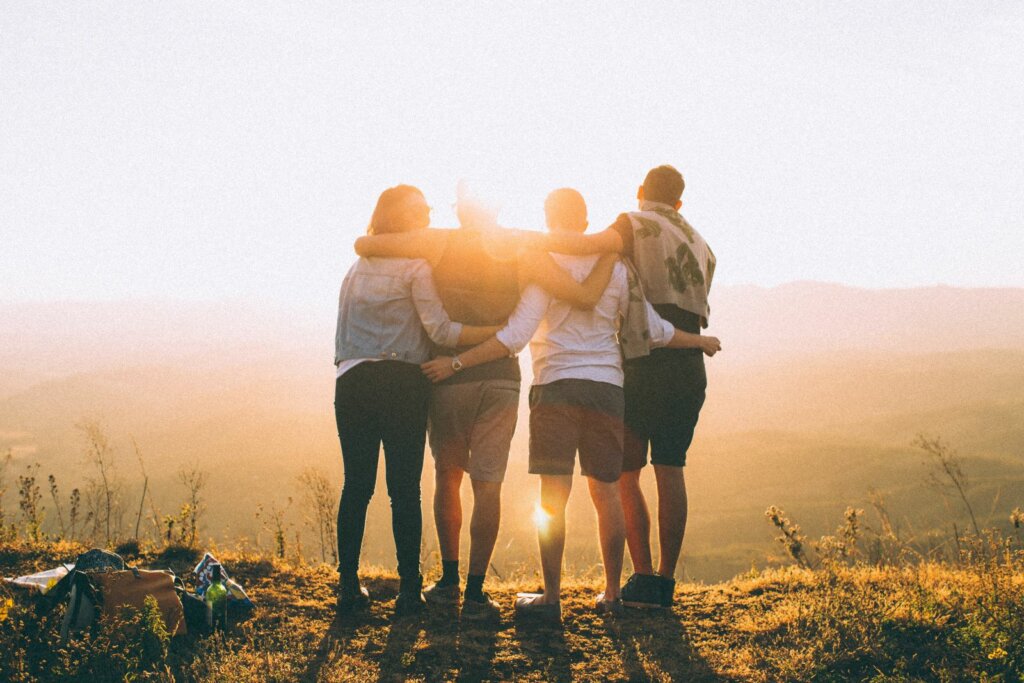
We all matter. Photo by Helena Lopes on Unsplash
We’re all undergoing metamorphosis, energy isn’t created or destroyed, so the person is still there but also not there and I’m sad about it. In my life, I’m mourning the sudden death of Matt Peter. I didn’t know him well, we didn’t chat on the phone, but what I did know is he was a good man. He genuinely tried to make the city of Albany, New York, a better place. He was a local politician who cared tremendously about his constituents and days before his death he participated in a charity run. That man showed up and he tried.
He approached politics with zeal like it was his mission in life, which tracks with what we say in my spiritual tradition. One of our tenets is that a person will merge in Cosmic Consciousness only after completing the duty assigned to them by Cosmic Consciousness. The trouble is, there’s no sand timer in the sky letting us know when the sand has run out. The person is there and then they’re not.
Some people worry about their legacy. They wonder how they’ll be remembered once they’re gone, if they made a difference, if anyone will think of them. I take comfort in that Carl Jung quote that says, “The meeting of two personalities is like the contact of two chemical substances: if there is any reaction, both are transformed.” If there was any reaction, you made a difference. You’ll be remembered. You mattered.
I’m not going to tell you to seize the day, to live life to the fullest, or any of the other platitudes we hear so frequently after someone dies. Instead, I’m reminded of that game where you stand in a circle and hold a piece of yarn while also throwing it to someone else in the circle. In the end, you wind up with a giant web that connects every person to everyone else. That’s what I think life is like. So of course when someone dies, the metaphorical yarn is tugged and we all feel it, some more deeply than others.
Yet every person in my life who has died, I miss. Every person counts no matter how tangential our relationship. And that is something worth remembering.
I dream of a world where we allow ourselves to grieve no matter when or how grief shows up. A world where we remember we each have a duty and when we’ve fulfilled that mission, we return to the Source of creation. A world where we realize we’re all connected and any death leaves an impact. A world where we understand that every person counts.
Another world is not only possible, it’s probable.
It’s a weird time to be Jewish and to celebrate Hanukkah, which commemorates a military victory. I’m still lighting the candles with my friends and family but the whole thing has me contemplating many things: how to be in the world, what I think, why it matters, and who is listening.
If I listen to people in the digital world, everything seems terrible. I don’t only mean the active wars. People are saying spiteful things during presidential debates. They’re presenting polarizing views and shooting for the lowest common denominator rather than higher ideals. If I only focus on the digital world, I get depressed. But in the physical world, things aren’t so bad depending on where you live.
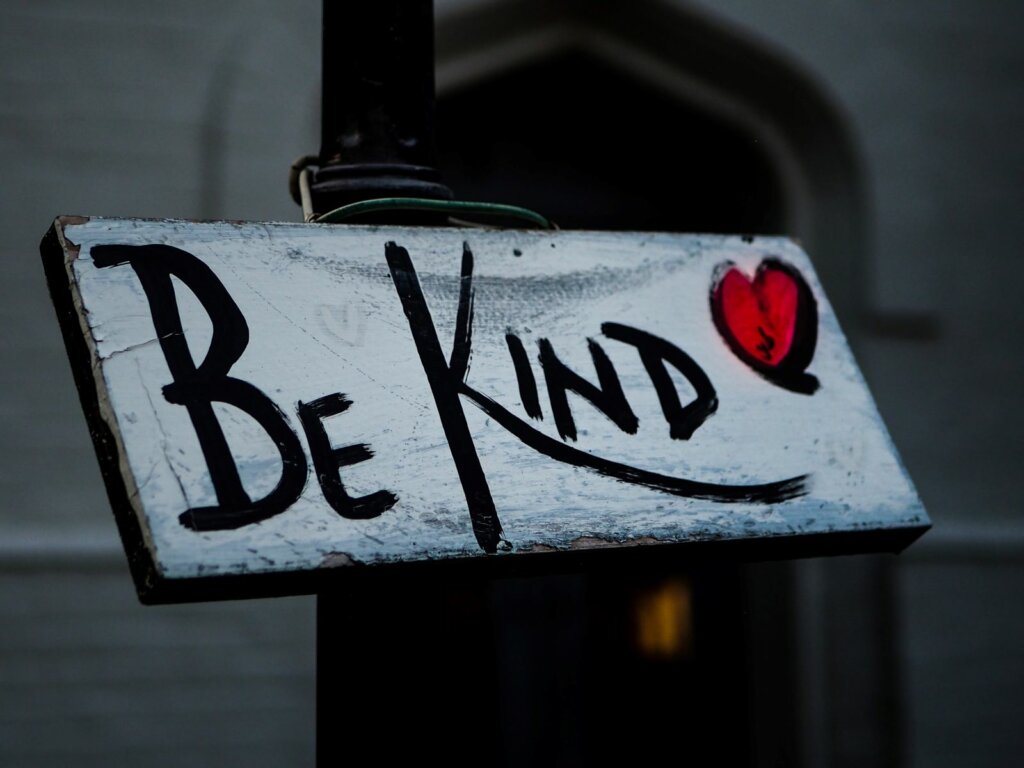
The sign says it all. Photo by Adam Nemeroff on Unsplash
In the physical world, people say, “Hey, is that your umbrella?” when they notice one left behind on a train seat. In the physical world, strangers smile at each other. In the physical world, good Samaritans help elderly ladies carry their walkers up bus steps. It reminds me of a poem by Danusha Laméris called “Small Kindnesses” that I’m quoting a portion of:
I’ve been thinking about the way, when you walk
down a crowded aisle, people pull in their legs
to let you by. Or how strangers still say “bless you”
when someone sneezes, a leftover
from the Bubonic plague. “Don’t die,” we are saying.
And sometimes, when you spill lemons
from your grocery bag, someone else will help you
pick them up. Mostly, we don’t want to harm each other.
We want to be handed our cup of coffee hot,
and to say thank you to the person handing it. To smile
at them and for them to smile back. For the waitress
to call us honey when she sets down the bowl of clam chowder,
and for the driver in the red pick-up truck to let us pass.
That’s my experience of the physical world. That mostly we don’t want to harm each other. That usually we see one another as human beings and say, “Here, let me make things a little easier for you.” It’s that genuine care and love for humanity that solves problems great and small, according to my spiritual teacher.
“This love will give people guidance; it will show them what to do and what not to do,” he said. “It is not necessary to study great numbers of books or to rely upon those who speculate with the future of the silent masses. The only essential requirement is to look upon humanity with genuine sympathy.”
That’s what I’m doing. Day by day, week after week, month after month, year after year, I’m looking upon humanity with genuine sympathy and love hoping that one day, it will all add up. That my small actions and someone else’s small actions will turn into something bigger and greater so that when people are out in the world, they’ll say to themselves, “Things aren’t so bad.”
I dream of a world where we recognize there can be a difference between what people say and how they treat each other. A world where we remember that people may be mean and spiteful on the internet, but in the physical world, they hold open doors for one another and say “bless you,” when someone sneezes. A world where we understand the only way to solve our problems great and small is by starting from a place of love and kindness.
Another world is not only possible, it’s probable.
One of my soul sisters sent me a birthday card that says, “This card is decorated with matter-of-fact boldness and fierceness, and so it is especially suited to you.” Her words keep ringing in my ears because I don’t feel particularly bold or fierce and I have trouble embracing those descriptions because for much of my life, the word “too” has been attached to adjectives describing me: too sensitive, too intense, too much. Some parts of me want to shrink and play small in order to stay safe. If I hit a certain threshold of boldness, fierceness, and intensity, I want to reel it back in but I’m not able to do that anymore.
My body is making it clear that I’m expanding my threshold, that I can’t keep holding myself back. And in the external world, I’m receiving affirmation that living boldly is a good thing. This weekend I went to “Let’s Glow SF,” which is a festival that projects visual art onto the side of buildings and plays accompanying music. These are 285-foot projections of penguins and ships and geometric shapes. These are unapologetic pieces of art that are made to be noticed. I didn’t hear a single person say, “I wish they were smaller.” Instead, every person appreciated how big and bold the art was. We all oohed and aahed at how cool it was to see art of this magnitude.
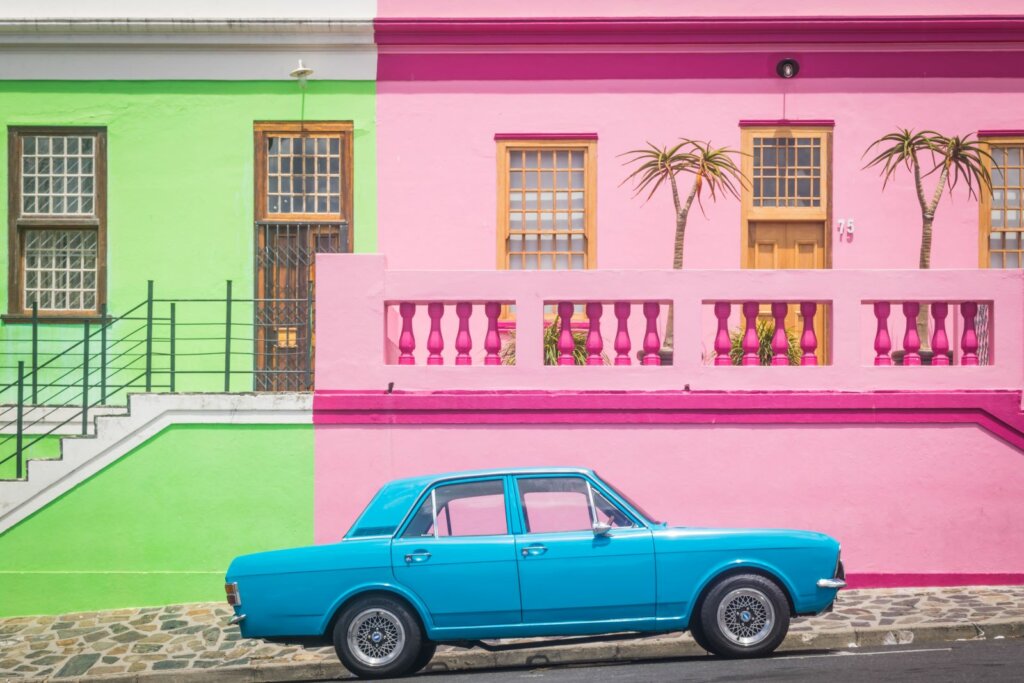
The colors! The beautiful boldness! Photo by Claudio Fonte on Unsplash
Another affirmation about living boldly comes from one of my non-blood nephews. At almost 20 months, his favorite expression at the moment is, “More, more.” Stirring tealights in a metal bowl? “More, more!” Having a dance party in the living room? “More, more!” If it’s not’s bedtime or something harmful, the adults in his life are acquiescing to “more, more.” As someone who’s used to “less, less,” it’s astounding to give and receive “more, more.” It’s sweet to watch the fullness of my nephew be celebrated. Witnessing him, I see that the passion and excitement truly are a part of his makeup. What if the same is true about me?
In my spiritual tradition, we say everyone is born with certain inborn traits and characteristics. It’s how we’re made, if you will. The environment also shapes us so this isn’t a “nature versus nurture” thing, more like a “nature and nurture thing.” How this relates to me is that I’m not “too” anything. I’m just right because I was born this way. I’m a highly sensitive person and that means I’m attuned to things other people don’t notice. I’m a passionate person and that means I love deeply. I’m a direct person so nothing is hidden with me.
I won’t qualify those characteristics by saying they’re good or bad because the truth is the answer varies depending on who you ask. Some people will think I’m “too” whatever. But others will think I’m not “enough” whatever. The more important question is how do I feel? How I’m feeling is that I want to be my full and true self. I want to be more of who I am without self-imposed limitations. I want to be like the artwork I absorbed this weekend and my nephew who’s a delight. I want to be the person my higher power made me to be, and that includes someone bold and fierce. And I want that for you too.
If voices tell you you’re too much or not enough, I encourage you to question whether that’s true. Is it the capital “T” Truth or is it just someone’s opinion? Would someone else think differently? Could you, too, embrace the fullness and authenticity of who you are? If so, I’ll be over here cheering you on.
I dream of a world where we allow ourselves to be who we are. A world where we recognize people will always have opinions about how we should act but that doesn’t mean we have to pay attention to them. A world where we express the fullness of ourselves because we understand we were made the way we are. A world where we allow ourselves to live boldly and fiercely.
Another world is not only possible, it’s probable.
(If you’re an email subscriber, I recommend you read this post in your email because it’s personalized.)
Lately, I’ve been tired and wired. It’s in part due to personal stressors but it’s also because things in the world are so intense. If you’ve been on social media even a little, you know people have been expressing strong opinions. Their messages are laced with pain, anger, grief, and trauma. It’s a lot. And while a part of me wants to burrow under the covers or zone out by watching Netflix, I know that’s not a long-term solution. What can I do instead that would be helpful for me and anyone in my orbit?
I have two answers. The first is to rest. When I’m frazzled, when I’m not centered and grounded in my body, everything is worse. I struggle to show up for myself and do basic things like washing dishes and grocery shopping. I also struggle to show up for other people because I don’t have the emotional capacity to do so. I hate it when my Higher Power tells me to rest, but, well, I need to rest. If you do too, I have some options for you.
One method I find particularly nourishing is yoga nidra, which is non-sleep deep rest that induces delta waves. A study from 2011 found yoga nidra helped war veterans reduce rage, anxiety, and emotional reactivity while increasing feelings of relaxation, peace, self-awareness, and self-efficacy. In 2014, a study by Pamela Pence found sexual trauma survivors reported significant decreases in PTSD symptoms, negative thoughts of self-blame, and depression. If you want to try yoga nidra, I like the free recordings from Ally Boothroyd.
The other answer that I’m hearing from Higher Power about what would be helpful is, “Be the personification of love,” which is the meaning of my Sanskrit name. My birthday is on Friday, December 1, so I’d like to think my essence is particularly amplified at the moment. (Side note, if you feel so inclined, please do reach out to me on Friday. I absolutely love hearing from people on my birthday but if you forget or you don’t want to get in touch, that’s fine too. No pressure.)
Sometimes being the personification of love means beaming love in someone’s direction but in this instance, I feel called to imagine what message the Divine Beloved has for all of us. To that end, I’ve written a love letter from the universe to everyone. Enjoy.
My dear,
I know things are challenging right now. I know tempers are running high. Sometimes the world feels like too much and you want to sink into hopelessness and despair. But I want you to know that you are needed right now. You came onto this Earth for a reason, a very good reason. Without you, the world wouldn’t evolve in the way it needs to, the way it must. Many people are seeking to divide humanity, to place them in one group or another but I want you to see the goodness in everyone, the divine in everyone, even though that’s difficult, very difficult.
You are a bright shining star that is so very loved by Me. You cannot see or fathom just how loved you are, how precious, how sacred. You can’t always feel it but My love is still there. It’s in the smile of a baby, the bloom of a rose, a rainbow in the sky. It holds you, surrounds you, and is you. Don’t forget that. You are love itself and it’s what you give as well as receive.
Love is the miracle that heals all things and you are a vehicle for that miracle. Love is more powerful than all the divisive tendencies, all the strife, all the weapons in the world. You, my dear, are born of love and returning to love. There’s magic in your bones and life in your body. I ask you to go into the world and spread this love whenever and wherever you can. You are blessed, you are precious, and all is well.
I dream of a world where we remember love is the miracle that heals all things. A world where we remember how loved we are, how cherished. A world where we spread love as much as we can because we recognize love is more powerful than any negative force in existence. A world where we let ourselves bathe in the love from the universe.
Another world is not only possible, it’s probable.
I have some notes for the cosmic powers that be. Is there a way to lodge complaints? A manager I can speak to? No? Who designed this system?!? At times like these, I understand why people question the existence of God/Higher Power/Source, etc. because if there is a God, why would It allow all these awful things to happen?
I think about this a lot both in terms of my personal life and in the broader world. Being the human I am, I want the world to revolve around me. I want things to go how I think they should go and struggle when they don’t. However, I have enough humility to recognize my perspective is limited. I’m not omniscient, omnipresent, or omnipotent but I do believe there is an entity that has all those traits.
If that’s so, then how can I account for all the atrocities in the world? Wouldn’t an all-powerful loving entity want to stop things like war? First off, yes, which is why every spiritual teacher ever preaches love, acceptance, and respect. The sticky wicket is that humans have free will. According to my spiritual philosophy, we are all on a spiritual journey. Not just humans but plants and animals too. Plants and animals are moving instinctually toward Cosmic Consciousness but humans have the blessing? the curse? of being able to choose whether they want to move closer or further away. And sometimes people choose things that I wouldn’t.
But an omnipotent entity can make anything happen because that’s what omnipotent means so why wouldn’t a loving Higher Power intervene in these instances? Why wouldn’t a loving Higher Power say, “I’m putting a stop to all this conflict”? The answer I keep coming to VERY begrudgingly is in this spiritual journey, Cosmic Consciousness is playing the long game. It’s not only about what happens today, tomorrow, or 50 years from now. It’s about what happens 500 years from now, 5,000 years from now. What will best serve humanity’s evolution? What will help us evolve as a species?
I hate this answer, truly I do, but sometimes what helps us grow the most is strife. I used this quote just the other week but it’s again applicable: “Whenever there is clash or conflict within any structure, whether subtle or crude, it acquires subtlety. This applies to both psychic clash and physical clash. The more subtle the crude mind becomes as a result of internal clash, the greater its spiritual awakening.”
In other words, I think society is undergoing a spiritual awakening. Do I love the mechanism for it? Not in the least, but I’m choosing to believe this is part of a larger plan that I’m not privy to. That all this psychic and physical clash is fertilizer for our evolution, leading us somewhere we want to go.
To quote my spiritual teacher again, “All human beings want light. One individual human is more luminous and more throbbing than that universal darkness. So human beings should always be optimistic. The cimmerian darkness cannot retard your progress, cannot cover the light of the human heart. The spirit of your heart must move on and on against obstacles. Kick away your obstacles like pebbles from your feet – you are stronger than your obstacles.”
I firmly believe the obstacle we are kicking away from our feet is narrow-mindedness and anything that seeks to strip us of our humanity. Whatever reduces people to segmented groups, whatever urges binary ways of thinking and acting, whatever encourages us to cover the light of our hearts is what we’re working to get rid of day by day, little by little until eventually, more of us will be spiritually awake than asleep.
I dream of a world where we take heart in trying times because we understand there’s something bigger than us happening. A world where we realize we are each playing a part in a Cosmic drama. A world where we recognize that growth happens in response to clash. A world where we remember society as a whole is experiencing a spiritual awakening.
Another world is not only possible, it’s probable.
I always find Diipavali or Diwali to be an interesting holiday. The timing changes because it’s attached to the new moon in the month of Karttik, which is mid-October to mid-November. It’s dark, there’s no illumination. Symbolically, the day before Diipavali represents a time when it seems like light can’t win, won’t win. That evil will triumph and maintain its grip on society.
And then the holiday arrives. Diipavali signals to us that light is victorious, that good does triumph over evil and that knowledge eventually prevails. According to my spiritual teacher, the origins of Diwali are a war battle. A king attacked Lord Krsna’s capital city, Dwaraka, and the warrior Satyabhámá, a woman, I might add, launched a fierce counterattack against the invading forces. The army was defeated and the whole city was joyful. Residents celebrated by lighting fourteen candles and on the following evening worshipped Satyabhámá with festivities and elaborate lights.
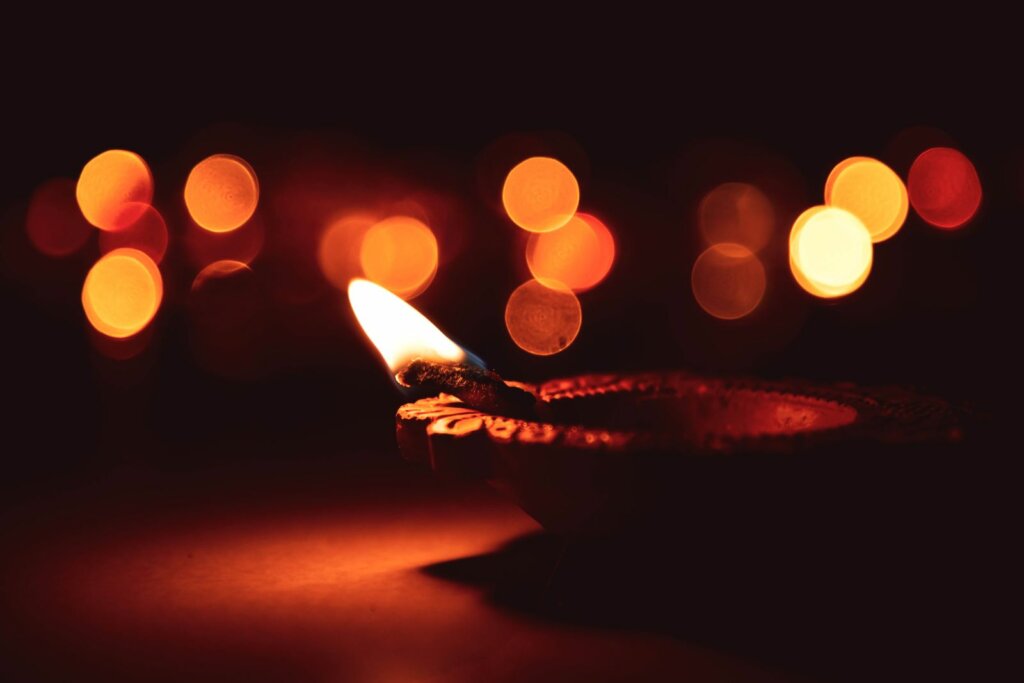
We can be the light. Photo by wilson mathew on Unsplash
That’s exactly what diipavali means. The word comes from dīpa, which means lamp or light, and āvali, which means a row, a range, a continuous line, a series. So we’re celebrating a row of lamps both literally and metaphorically. You might notice Diipavali is similar to Hanukkah, another holiday that involves lights in a row. And just like modern Jews celebrating Hanukkah, Diwali is no longer about a war battle. It represents a symbolic battle where we remember the flame of one lamp lights up countless others both literally and metaphorically.
I’ve had moments recently where I want to burrow under the covers and completely withdraw from the world. I don’t enjoy what’s happening nor the vitriol it’s inspiring. Everything seems so dark and then I remember a quote from Rumi who said, “If everything around seems dark, look again, you may be the light.”
I think that’s what Diipavali reminds us. It’s not only that in the end good will triumph, it’s also the recognition we have a part to play in that victory. When we spread our light, our goodness, we light up other people. And together, we create a row of lights such that darkness retreats. We may be few in number but that doesn’t mean we’re any less powerful.
To paraphrase my spiritual teacher, the strength of five good people is more than the united strength of a hundred immoral people. It also echoes the famous Margaret Mead quote: “Never doubt that a small group of thoughtful, committed citizens can change the world; indeed, it’s the only thing that ever has.”
A lot of little lights can conquer darkness. And this is something we must do over and over again. Unlike a single war battle, Diipavali encourages us to hold onto light, to keep shining, and to remember that one by one by one our actions add up to something bright.
I dream of a world where we have faith that good always wins in the end. A world where we remember light drives out darkness. A world where we understand that we all have a part to play in making the world a better place. A world where we recognize that our light lights up others. A world where we hold onto that light and create a better world for everyone.
Another world is not only possible, it’s probable.
When I was 7, there was a boy in my first-grade class that I didn’t like. I don’t remember why, his name, face, or any identifying features, but what’s seared into my brain is how I treated him on Valentine’s Day. It’s standard practice to give all the kids in your class a Valentine and for this boy, I decided to let him know how I really felt about him. I took out a piece of notebook paper and wrote, “I hate you, I hate you, I hate you, I hate you, I hate you,” until I ran out of space. But that didn’t feel like enough so I asked my brother, “What’s a word that means over and over again?” and he responded, “Et cetera,” which of course I didn’t know how to spell.
So at the end of a page filled with “I hate yous” I tacked on an “etc.” I tucked the paper into an envelope and signed my name so he would know it was from me. The next day I watched his face crumple reading my “Valentine.” He showed the piece of paper to our teacher and she said, “I’m sure she didn’t mean it.” I remember feeling mixed emotions because I did mean it. I did hate him but at the same time, I didn’t expect him to respond the way he did. In my mind, he was a monster, incapable of emotions, but seeing how hurt he was gut-punched me.
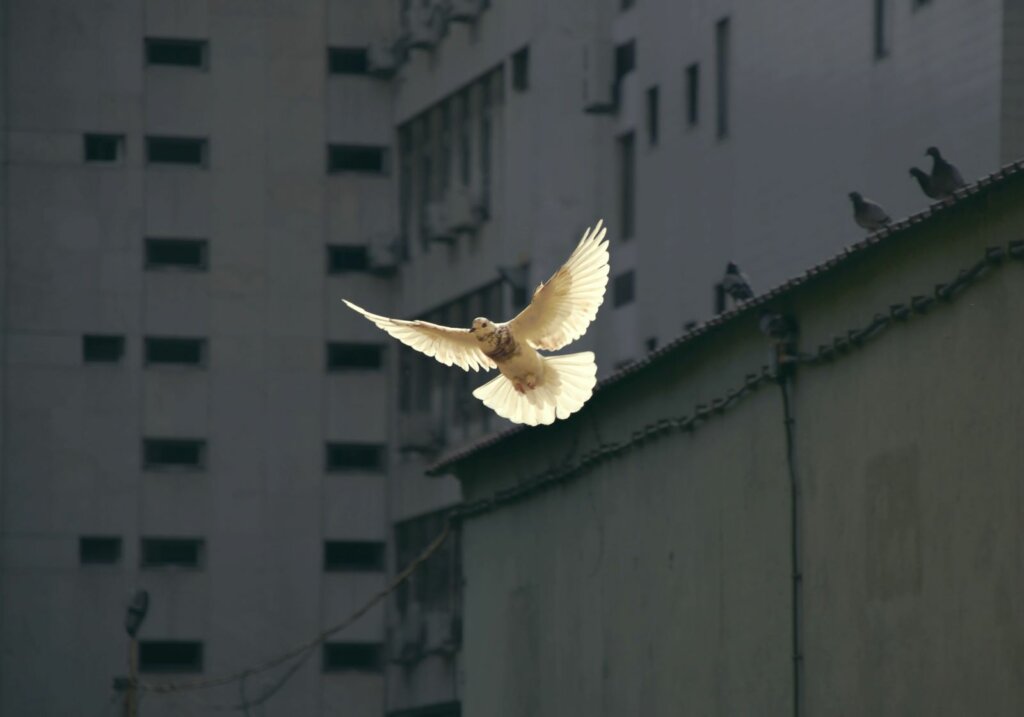
Peace is possible if we do the internal work. Photo by Sunguk Kim on Unsplash
As a 7-year-old, I wasn’t thinking about how this little boy would feel. All that mattered was expressing how I felt because I was the wronged party. He was mean to me. What I did to this little boy is what some people are doing now – they are only thinking about how they feel, not the impact their words will have on other people. What I also did to this boy is I dehumanized him. As a 7-year-old, there weren’t dangerous consequences to my perception but that’s not true for adults.
When you perceive a human being as an animal or a monster that must be destroyed, you will put them in a cage. You will bomb the crap out of their homeland. You will decapitate them and their family. You will do whatever it takes to show them how you feel without considering how they feel.
It’s worth mentioning that balance is important. There is such a thing as considering someone else’s feelings too much and that’s known as codependence. By and large though, we’re suffering from a lack of empathy, not too much of it. As a highly sensitive person, I’ve been crying about the ugliness in the world. It feels not great to read people are saying, “Gas the Jews!” and “Wipe Gaza off the face of the Earth!” Have we forgotten, just like I did, that words hurt? They don’t leave a visible mark like bruises do but can ring in your ears long after a physical injury has healed.
What do we do about this? How can we remember each other’s humanity when it feels so very challenging? There’s a Nonviolent Communication (NVC) exercise called simply “the exercise” that is so powerful for this. It’s a way to shift your inner landscape closer to connection, compassion, and peace. Any movement in that direction is a win so don’t worry if you’re not suddenly filled with peace after doing it.
I know it’s easy to let anger fuel us, I’m guilty of that myself, but if you have even a modicum of a desire to create a peaceful planet that goes beyond the limits of small social identities, I encourage you to do the exercise I linked to. Not only that, share it with your friends. As humans, we don’t have to give in to our baser instincts. There is another way. We can move toward peace but it requires more than a ceasefire. It requires us to view each other differently.
I dream of a world where we recognize how dangerous it is to only think about how we feel and not how others feel. A world where we don’t let anger and hatred fuel us. A world where we do the work to see others as human beings no matter how hard it is. A world where we all work together to move toward peace.
Another world is not only possible, it’s probable.
No one would describe me as a clumsy person. In fact, it’s just the opposite. I took ballet for years and my reflexes are quick but in the last week, I’m a veritable butterfingers. Objects are literally jumping from my hands. I was in a store the other day and my credit card flew across the counter six feet away and got wedged between a table and the wall. I opened a package and the contents skittered across my kitchen floor.
More energy is coursing through my system, my mind and body are going in a million different directions, and I can’t seem to sit still. Again, that’s highly unusual for me! I generally don’t have problems with focus but these days my insides (and outsides, honestly) feel chaotic, messy, and discombobulated. Normally I’d try to tamp all this down and rein the energy back in but I keep thinking about what my chiropractor tells me about this phase of my healing: “You’re reorganizing.” I’m like a tornado picking up objects and hurtling them to another location.

What I like about this photo is it reminds me of the Pillars of Creation. Photo by Angel Luciano on Unsplash
The question worth asking is, “What will be created from all this disarray?” There’s a quote on my fridge from Friedrich Nietzsche that says, “One must still have chaos in oneself to be able to give birth to a dancing star.” So often chaos is painted as scary, undesirable, something to avoid at all costs but as Reggie Ray, the spiritual director of the Dharma Ocean, said in a dharma talk, “Chaos is the source of life.”
Oooooh boy. Chaos is the source of life? It’s not order and structure? Sadly, no. As we are all aware, we are made up of stardust, to paraphrase Carl Sagan. To quote an article on the subject:
“The carbon, nitrogen, and oxygen atoms in our bodies, as well as atoms of all other heavy elements, were created in previous generations of stars over 4.5 billion years ago. Because humans and every other animal as well as most of the matter on Earth contain these elements, we are literally made of star stuff.”
What that means is we’re the product of chaos. All the debris from supernovas exploding and comets colliding led to us. It also led to some of the things we consider the most precious. Ultra-high precision analyses of some of the oldest rock samples on Earth by researchers at the University of Bristol provide clear evidence that “the planet’s accessible reserves of precious metals are the result of a bombardment of meteorites more than 200 million years after Earth was formed.” Gold? Platinum? Both here because of meteors.
In my spiritual tradition, we use the word “clash” a lot, which describes the meeting of opposing forces. If you think about it, that’s basically what chaos is. One force is striving for order, the familiar, the steady whereas another is calling for disorder, the new, the unsteady. My spiritual teacher says, “Whenever there is clash or conflict within any structure, whether subtle or crude, it acquires subtlety. This applies to both psychic clash and physical clash. The more subtle the crude mind becomes as a result of internal clash, the greater its spiritual awakening.”
What’s happening to me, I think, is another spiritual awakening where I’m becoming more myself but to create that new me requires some chaos.
I dream of a world where we understand to create something new, including ourselves, requires chaos sometimes. A world where we recognize there may be gold waiting for us at the end of an unstable period. A world where we realize internal clash and conflict is an asset, spurring spiritual growth.
Another world is not only possible, it’s probable.
I had an experience a few days ago that I keep thinking about. If you follow me on Instagram (@krsnasfav), you already heard this story, but I want to share it here too. As I walked to the chiropractor, I felt dismal, irritated, and hopeless. Everything surrounding Israel and Palestine weighed me down, I didn’t hear back from people I expected to hear back from, and things were just not working how I wanted them to.
I don’t know why I had this urge, but I looked up at the sky and saw a rainbow reflected in a cloud. I took a picture and glanced around, wondering if anyone else also saw this rainbow. Even though my phone was pointed upward, and my head tilted back, the other passersby didn’t notice. They didn’t look up. After 10 seconds, the rainbow disappeared.
It felt like a sign specifically for me, but because I can’t keep these things to myself, it feels like a sign for you too because you’re a part of my life. After seeing that rainbow, my whole mood shifted. I was reminded good things are possible, that life has a way of working out, and maybe I didn’t need to be quite so down in the dumps.
I would say a feeling of hope returned but apparently hope is not what I think it is. Research defines hope as a “positive motivational state that is based on an interactively derived sense of successful (a) agency (goal-directed energy), and (b) pathways (planning to meet goals).” Optimism on the other hand is the belief that somehow – either through luck, others’ actions, or your own actions – that the future will be successful and fulfilling.
While technically I felt optimistic, that word doesn’t sit right with me because seeing a random rainbow in a cloud, which is a rare occurrence, and on a sunny day, is a message of hope if I’ve ever heard of one. That rainbow was a harbinger of good things to come because wouldn’t you know it? My week turned around. The checks I was waiting on came in the mail, people finally got back to me, and I heard more care and nuance about the Israel-Palestine situation.
It only takes one moment but your whole mood can shift. I forget that. I get stuck on the “Life is like this and it will always feel like this,” setting. But when I see things like rainbows, hearts, or the word “love,” I’m reminded that there is a loving, benevolent force in the world and It’s doing Its best to draw me closer to It.
My spiritual teacher says, “When people advance, that which propels them from behind is known as momentum, and that which pulls them from in front is known as attraction. Momentum and attraction can be physical, psychic, and also spiritual.”
That’s what hope feels like to me, something pulling me from the front, urging me forward, whispering to me not to give up even when giving up feels like the most natural thing in the world. How do I regain hope when I feel hopeless? I think it’s by having things work out the way I want them to, but maybe really, it’s by seeing how the universe is pulling me toward it, calling me, and saying, “I’m here. You’re not alone. All is well.”
I dream of a world where we look for signs of hope around us. A world where we understand life can change in an instant for the better. A world where we remember we’re being pulled forward by a power greater than ourselves. A world where we regain a sense of hope when we’re hopeless.
Another world is not only possible, it’s probable.


